人教版(2019)必修第一册Unit 3 Sports and Fitness Discovering Useful Structures 课件(共29张PPT,内嵌视频)
文档属性
| 名称 | 人教版(2019)必修第一册Unit 3 Sports and Fitness Discovering Useful Structures 课件(共29张PPT,内嵌视频) | 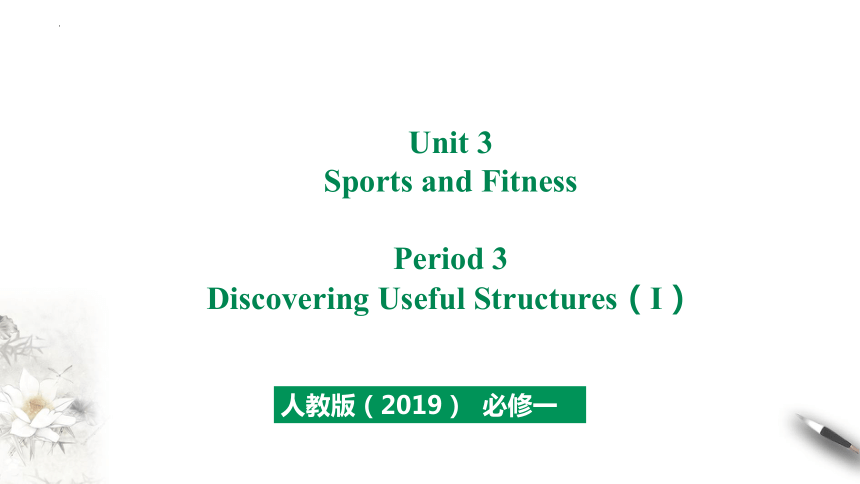 | |
| 格式 | pptx | ||
| 文件大小 | 16.8MB | ||
| 资源类型 | 教案 | ||
| 版本资源 | 人教版(2019) | ||
| 科目 | 英语 | ||
| 更新时间 | 2024-07-31 09:30:17 | ||
图片预览

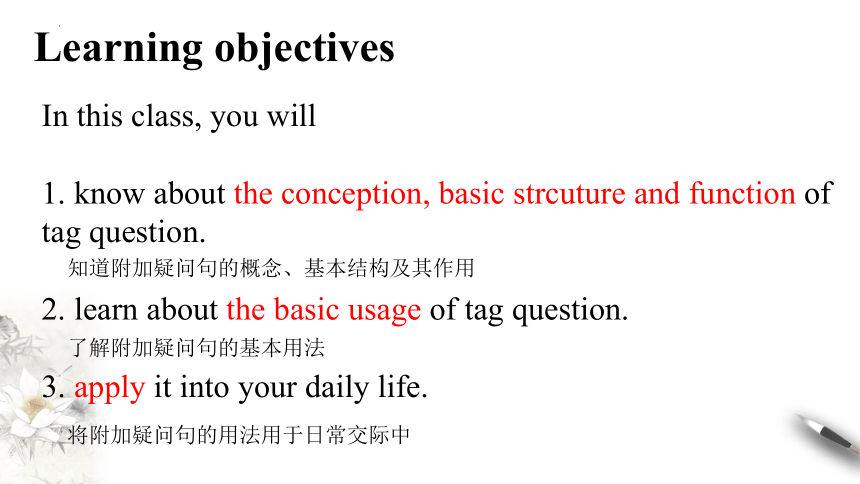
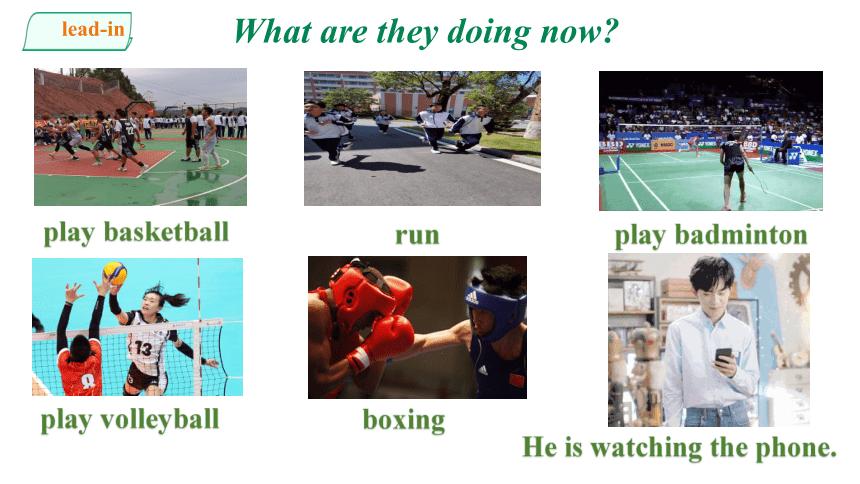

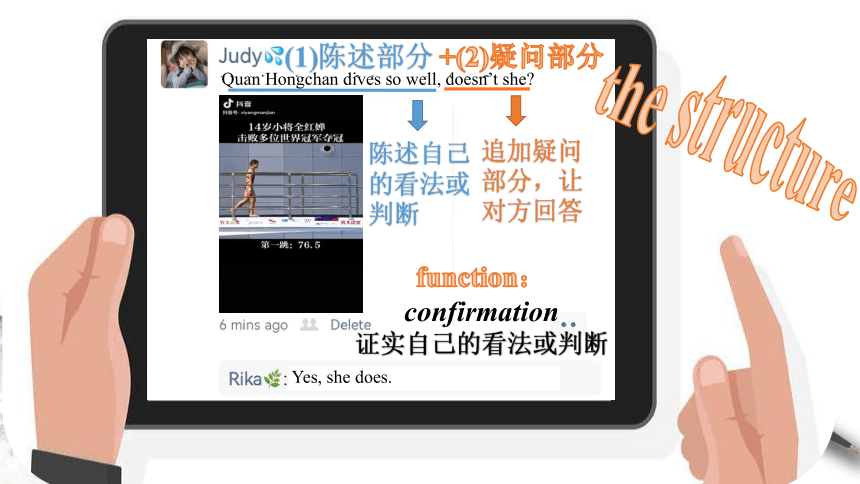
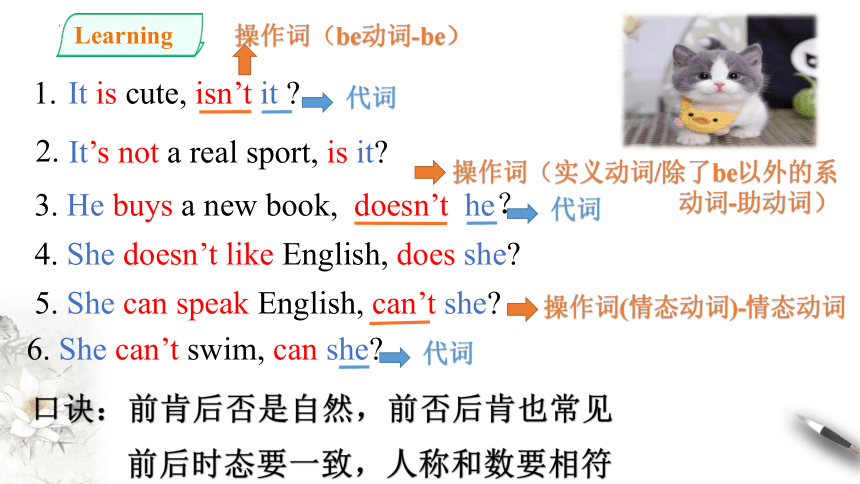

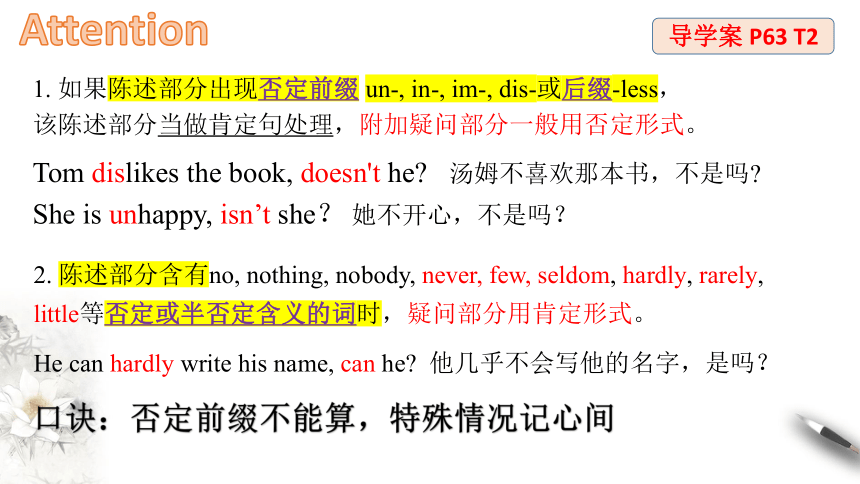
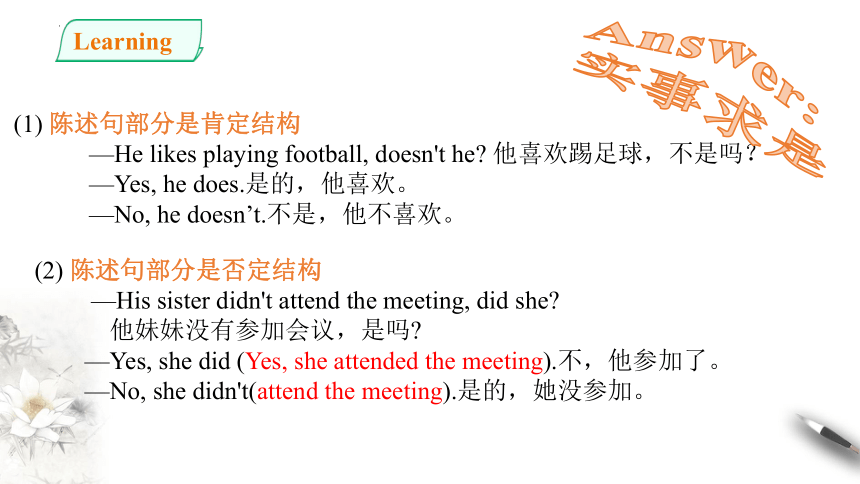
文档简介
(共29张PPT)
Unit 3
Sports and Fitness
Period 3
Discovering Useful Structures(I)
人教版(2019) 必修一
In this class, you will
1. know about the conception, basic strcuture and function of tag question.
2. learn about the basic usage of tag question.
3. apply it into your daily life.
Learning objectives
知道附加疑问句的概念、基本结构及其作用
了解附加疑问句的基本用法
将附加疑问句的用法用于日常交际中
Video
lead-in
What are they doing now
play basketball
run
play badminton
play volleyball
boxing
He is watching the phone.
Video
Sports Day
tag question
附加疑问句
今天天气真好啊,不是吗?
lead-in
Video
Sports Day
Quan Hongchan dives so well, doesn’t she
Yes, she does.
+(2)疑问部分
(1)陈述部分
the structure
陈述自己的看法或判断
追加疑问部分,让对方回答
function:
confirmation
证实自己的看法或判断
Learning
It’s not a real sport, is it
It is cute, isn’t it
1.
2.
3. He buys a new book, doesn’t he?
4. She doesn’t like English, does she
操作词(be动词-be)
代词
操作词(实义动词/除了be以外的系 动词-助动词)
5. She can speak English, can’t she
操作词(情态动词)-情态动词
代词
6. She can’t swim, can she
口诀:前肯后否是自然,前否后肯也常见
代词
前后时态要一致,人称和数要相符
1.They arrived at the train station ,
2.Tom wasn't at school,
3.They will come to the party,
4.The students in Class 12 won't go to the park,
5.She has gone to town,
didn’t they?
was he
won't they
will they
hasn't she
Practice
1. 如果陈述部分出现否定前缀 un-, in-, im-, dis-或后缀-less,
该陈述部分当做肯定句处理,附加疑问部分一般用否定形式。
Tom dislikes the book, doesn't he 汤姆不喜欢那本书,不是吗
She is unhappy, isn’t she? 她不开心,不是吗?
2. 陈述部分含有no, nothing, nobody, never, few, seldom, hardly, rarely, little等否定或半否定含义的词时,疑问部分用肯定形式。
He can hardly write his name, can he 他几乎不会写他的名字,是吗?
Attention
口诀:否定前缀不能算,特殊情况记心间
导学案 P63 T2
(1) 陈述句部分是肯定结构
—He likes playing football, doesn't he 他喜欢踢足球,不是吗?
—Yes, he does.是的,他喜欢。
—No, he doesn’t.不是,他不喜欢。
(2) 陈述句部分是否定结构
—His sister didn't attend the meeting, did she
他妹妹没有参加会议,是吗
—Yes, she did (Yes, she attended the meeting).不,他参加了。
—No, she didn't(attend the meeting).是的,她没参加。
Answer:
实事求是
Learning
A: It's not going to rain , is it
B: It's a good day for sports.
A:Then we can play football,
B We don't have a ball.
Answer:
实事求是
Practice
口诀:实际情况来回答,再把yes和no练
课本 P40 T2
No, it isn’t (going to rain).
can’t we?
No, we can’t (play football).
2)A: It's Sports Day next Thursday,
B: You're right, it is. Let's ask Xia Lei if she wants to join a team.
A: She likes soccer,
B: But she loves volleyball. She could be in the volleyball team.
3)A:It's time for badminton class. Where is the coach He is late,
B:It's been 10 minutes already. He isn't coming,
A:Cool! We can have a good time. That's great!
B:Shh!
A:Oh no, he's right behind me,
C: Yes, I am.
isn’t it?
doesn’t she
isn’t he
is he
isn’t he?
Homework
No, she doesn’t.
项目 姓名
Shot put competition(扔铅球) 邬祖方
jump rope competition(跳绳) 李怡汶、邱迈辉、叶懿慧、谢小容、吴鸿翔
400-meter race(400米) 江千慧
1500-meter race(1500米) 郑德成、唐秋光、张秋源
The school sports meeting is coming!
Zheng Decheng: The Sports Day is coming soon, isn’t it 校运会马上要来了,不是吗
Jiang Qianhui: Yes, it is. Wu Zufang signed up for the Shot put competition, didn’t he ?
是的,校运会要来了。邬祖方报名了扔铅球比赛,他没有吗?
Zheng Decheng: Yes, he did. And Tang Qiuguang will take part in 1500-meter race, won’t he?
是的,他参加了,唐秋光也将会参加1500米的跑步比赛,他不会去参加吗?
Jiang Qianhui: Yes, he will. He is a brave boy. 是的,他将会参加,他可是个勇敢的男孩啊。
Discussion
Unit 3
Sports and Fitness
Period 3
Discovering Useful Structures (Ⅱ)
人教版(2019) 必修一
In this class, you will
1. know about special usage of tag question.
2. apply it into your daily life.
Learning objectives
Enjoy the Sports Day!
Cao Jing and Max are discussing the match arrangement(比赛安排).
There will be a running race, won’t there
Yes, there will be.
And there will not be a high jump competition in this moring, will there
No, there won’t be. 是的,今天早上没有跳高比赛。
The high jump competition is in the afternoon.
特殊人称1:there be句型的附加疑问部分仍用主语there.
Cao Jing and Max are discussing the match arrangement(比赛安排).
This arrangement is suitable, isn’t it
No, it isn’t.
For example, some people sign up for the 100-metre running and long jump. They had to take part in the long jump immediately after the running race. And.....
Yes, they are. 是的,这些安排不合理.
特殊人称2:指示代词this/that用it指代,these/those用they指代
Those are not reasonable, are they
Cao Jing and Max are discussing the match arrangement(比赛安排).
Everything seems all right now, doesn’t it
Oh, no.
I can’t wait to see the race! Nothing can stop me watching the race, can it
Yes, it can. For example, the rain....
特殊人称3:陈述部分主语是指物的不定代词“everything, something, anything, nothing”等,附加问句用it.
Yes, it does.
陈述部分的主语是指人的不定代词“everyone, someone, anyone, no one”等,疑问部分的主语用they或he
Everyone in your family is a teacher, aren’t they / isn’t he
Cao Jing and Max are discussing the match arrangement(比赛安排).
To run well isn’t easy, is it
Yes, it is.
But practising running everyday will make you do better, won’t it
特殊人称4:陈述部分主语是从句、不定式或动名词,附加部分的主语用it.
Yes, it is.
Review
特殊人称 附加疑问句人称
1. there
2. this/that/these/those
3. 不定代词 everything/ something/anything/nothing(物) 不定代词everyone, someone, anyone, no one(人)
4. 从句、不定式或动名词
there
this/that用it指代,
these/those用they指代
it
it
they / he
Lily and Max are watching the match.
When the whistle goes, we must be quiet, mustn’t we
Yes, we must.
must:表必须、有必要时,附加疑问部分用mustn’t或needn’t
mustn’t:表禁止,疑问部分用must
And We mustn’t walk to the runway, must we
No, we mustn’t (walk to the runway).
But I think we can accompany them on the edge of the runway(跑道边缘陪跑) .
No, I don’t agree. Oh, it begins. We must have a discussion later, needn’t we (我们有必要等会再讨论一下,是不是)
必须
禁止,不可以
需要,有必要
Lily and Max are watching the match.
Oh, no. Li Hua fell down. He must be hurt, isn’t he
Yes, he is.
must:表推测时,疑问部分不能用must,
而应该根据must后的动词结构采用相应的动词形式。
There is a little wet.
It must rain last night, didn’t it
Yes, it did. You must have heard about news of the coming typhoon, haven’t you
肯定,对现在的情况推测
No, I haven’t. I didn’t notice it.
表对过去(现完)的推测
表对过去的推测
Review
must 附加疑问句人称+操作词
1. must 必须
2. mustn’t 禁止
3. must 有必要
4. 表推测(肯定是)
mustn’t +人称
must +人称
mustn’t/needn’t +人称
根据must后的动词结构
采用相应的动词形式(注意时态)
At the break, Lily and Max are a little thirsty.
Are you thirsty Have a bottle of water, won’t you
祈使句:祈使句后面的附加疑问句一般用will you或won’t you,均可。
I’m a little hungry, too.
Have a slice of bread, will you
Sure. Let’s go there, shall we
Yes, I’d like to.
On the way to the shop, they meet Mrs. Maria.
Hi, where are you going to You are not allowed to leave here.
以Let’s开头的祈使句,后面用shall we,表邀请对方,包含对方。
以Let us/me开头的祈使句,其后的附加疑问部分用will you,是请求对方允许,不包含对方。
We are hungry and are going to buy some water and bread.
Let us go there, will you
(老师请你)让我们去那里吧,可以吗?
Lily: Let’s go there, shall we 我们一起去吧, 好吗?
祈使句 附加疑问句人称和操作词
1. 一般的祈使句
2. Let’s 让我们一起(包含)
3. Let us/me(请你)允许我们去...
will/won’t you
shall we
will you
After the sports day, they have a heated discussion. Complete the sentences!
Lily: Though we lost the race, I don’t think we are the loser, aren’t we Because we try our best.
Amy: Excuse me. I didn’t quite catch that. 我刚刚没听清。
You don’t think we are loser, do you
think,believe,suppose,imagine,expect等动词后接宾语从句在构成附加疑问句时,
主句主语为第一人称时,其后的附加疑问句句应与从句保持一致,
主句主语若非第一人称,附加疑问句与主句主语一致。
Find out the key points.
I (don’t) think ....的信息重心在“宾语从句”,附加问句应根据宾语从句设置。
You (don’t) think ...的信息重心在“主句”,其附加问句应根据主句设置。
He (doesn’t) think...的信息重心在“主句或从句”均可,根据
实际情况来变。
Unit 3
Sports and Fitness
Period 3
Discovering Useful Structures(I)
人教版(2019) 必修一
In this class, you will
1. know about the conception, basic strcuture and function of tag question.
2. learn about the basic usage of tag question.
3. apply it into your daily life.
Learning objectives
知道附加疑问句的概念、基本结构及其作用
了解附加疑问句的基本用法
将附加疑问句的用法用于日常交际中
Video
lead-in
What are they doing now
play basketball
run
play badminton
play volleyball
boxing
He is watching the phone.
Video
Sports Day
tag question
附加疑问句
今天天气真好啊,不是吗?
lead-in
Video
Sports Day
Quan Hongchan dives so well, doesn’t she
Yes, she does.
+(2)疑问部分
(1)陈述部分
the structure
陈述自己的看法或判断
追加疑问部分,让对方回答
function:
confirmation
证实自己的看法或判断
Learning
It’s not a real sport, is it
It is cute, isn’t it
1.
2.
3. He buys a new book, doesn’t he?
4. She doesn’t like English, does she
操作词(be动词-be)
代词
操作词(实义动词/除了be以外的系 动词-助动词)
5. She can speak English, can’t she
操作词(情态动词)-情态动词
代词
6. She can’t swim, can she
口诀:前肯后否是自然,前否后肯也常见
代词
前后时态要一致,人称和数要相符
1.They arrived at the train station ,
2.Tom wasn't at school,
3.They will come to the party,
4.The students in Class 12 won't go to the park,
5.She has gone to town,
didn’t they?
was he
won't they
will they
hasn't she
Practice
1. 如果陈述部分出现否定前缀 un-, in-, im-, dis-或后缀-less,
该陈述部分当做肯定句处理,附加疑问部分一般用否定形式。
Tom dislikes the book, doesn't he 汤姆不喜欢那本书,不是吗
She is unhappy, isn’t she? 她不开心,不是吗?
2. 陈述部分含有no, nothing, nobody, never, few, seldom, hardly, rarely, little等否定或半否定含义的词时,疑问部分用肯定形式。
He can hardly write his name, can he 他几乎不会写他的名字,是吗?
Attention
口诀:否定前缀不能算,特殊情况记心间
导学案 P63 T2
(1) 陈述句部分是肯定结构
—He likes playing football, doesn't he 他喜欢踢足球,不是吗?
—Yes, he does.是的,他喜欢。
—No, he doesn’t.不是,他不喜欢。
(2) 陈述句部分是否定结构
—His sister didn't attend the meeting, did she
他妹妹没有参加会议,是吗
—Yes, she did (Yes, she attended the meeting).不,他参加了。
—No, she didn't(attend the meeting).是的,她没参加。
Answer:
实事求是
Learning
A: It's not going to rain , is it
B: It's a good day for sports.
A:Then we can play football,
B We don't have a ball.
Answer:
实事求是
Practice
口诀:实际情况来回答,再把yes和no练
课本 P40 T2
No, it isn’t (going to rain).
can’t we?
No, we can’t (play football).
2)A: It's Sports Day next Thursday,
B: You're right, it is. Let's ask Xia Lei if she wants to join a team.
A: She likes soccer,
B: But she loves volleyball. She could be in the volleyball team.
3)A:It's time for badminton class. Where is the coach He is late,
B:It's been 10 minutes already. He isn't coming,
A:Cool! We can have a good time. That's great!
B:Shh!
A:Oh no, he's right behind me,
C: Yes, I am.
isn’t it?
doesn’t she
isn’t he
is he
isn’t he?
Homework
No, she doesn’t.
项目 姓名
Shot put competition(扔铅球) 邬祖方
jump rope competition(跳绳) 李怡汶、邱迈辉、叶懿慧、谢小容、吴鸿翔
400-meter race(400米) 江千慧
1500-meter race(1500米) 郑德成、唐秋光、张秋源
The school sports meeting is coming!
Zheng Decheng: The Sports Day is coming soon, isn’t it 校运会马上要来了,不是吗
Jiang Qianhui: Yes, it is. Wu Zufang signed up for the Shot put competition, didn’t he ?
是的,校运会要来了。邬祖方报名了扔铅球比赛,他没有吗?
Zheng Decheng: Yes, he did. And Tang Qiuguang will take part in 1500-meter race, won’t he?
是的,他参加了,唐秋光也将会参加1500米的跑步比赛,他不会去参加吗?
Jiang Qianhui: Yes, he will. He is a brave boy. 是的,他将会参加,他可是个勇敢的男孩啊。
Discussion
Unit 3
Sports and Fitness
Period 3
Discovering Useful Structures (Ⅱ)
人教版(2019) 必修一
In this class, you will
1. know about special usage of tag question.
2. apply it into your daily life.
Learning objectives
Enjoy the Sports Day!
Cao Jing and Max are discussing the match arrangement(比赛安排).
There will be a running race, won’t there
Yes, there will be.
And there will not be a high jump competition in this moring, will there
No, there won’t be. 是的,今天早上没有跳高比赛。
The high jump competition is in the afternoon.
特殊人称1:there be句型的附加疑问部分仍用主语there.
Cao Jing and Max are discussing the match arrangement(比赛安排).
This arrangement is suitable, isn’t it
No, it isn’t.
For example, some people sign up for the 100-metre running and long jump. They had to take part in the long jump immediately after the running race. And.....
Yes, they are. 是的,这些安排不合理.
特殊人称2:指示代词this/that用it指代,these/those用they指代
Those are not reasonable, are they
Cao Jing and Max are discussing the match arrangement(比赛安排).
Everything seems all right now, doesn’t it
Oh, no.
I can’t wait to see the race! Nothing can stop me watching the race, can it
Yes, it can. For example, the rain....
特殊人称3:陈述部分主语是指物的不定代词“everything, something, anything, nothing”等,附加问句用it.
Yes, it does.
陈述部分的主语是指人的不定代词“everyone, someone, anyone, no one”等,疑问部分的主语用they或he
Everyone in your family is a teacher, aren’t they / isn’t he
Cao Jing and Max are discussing the match arrangement(比赛安排).
To run well isn’t easy, is it
Yes, it is.
But practising running everyday will make you do better, won’t it
特殊人称4:陈述部分主语是从句、不定式或动名词,附加部分的主语用it.
Yes, it is.
Review
特殊人称 附加疑问句人称
1. there
2. this/that/these/those
3. 不定代词 everything/ something/anything/nothing(物) 不定代词everyone, someone, anyone, no one(人)
4. 从句、不定式或动名词
there
this/that用it指代,
these/those用they指代
it
it
they / he
Lily and Max are watching the match.
When the whistle goes, we must be quiet, mustn’t we
Yes, we must.
must:表必须、有必要时,附加疑问部分用mustn’t或needn’t
mustn’t:表禁止,疑问部分用must
And We mustn’t walk to the runway, must we
No, we mustn’t (walk to the runway).
But I think we can accompany them on the edge of the runway(跑道边缘陪跑) .
No, I don’t agree. Oh, it begins. We must have a discussion later, needn’t we (我们有必要等会再讨论一下,是不是)
必须
禁止,不可以
需要,有必要
Lily and Max are watching the match.
Oh, no. Li Hua fell down. He must be hurt, isn’t he
Yes, he is.
must:表推测时,疑问部分不能用must,
而应该根据must后的动词结构采用相应的动词形式。
There is a little wet.
It must rain last night, didn’t it
Yes, it did. You must have heard about news of the coming typhoon, haven’t you
肯定,对现在的情况推测
No, I haven’t. I didn’t notice it.
表对过去(现完)的推测
表对过去的推测
Review
must 附加疑问句人称+操作词
1. must 必须
2. mustn’t 禁止
3. must 有必要
4. 表推测(肯定是)
mustn’t +人称
must +人称
mustn’t/needn’t +人称
根据must后的动词结构
采用相应的动词形式(注意时态)
At the break, Lily and Max are a little thirsty.
Are you thirsty Have a bottle of water, won’t you
祈使句:祈使句后面的附加疑问句一般用will you或won’t you,均可。
I’m a little hungry, too.
Have a slice of bread, will you
Sure. Let’s go there, shall we
Yes, I’d like to.
On the way to the shop, they meet Mrs. Maria.
Hi, where are you going to You are not allowed to leave here.
以Let’s开头的祈使句,后面用shall we,表邀请对方,包含对方。
以Let us/me开头的祈使句,其后的附加疑问部分用will you,是请求对方允许,不包含对方。
We are hungry and are going to buy some water and bread.
Let us go there, will you
(老师请你)让我们去那里吧,可以吗?
Lily: Let’s go there, shall we 我们一起去吧, 好吗?
祈使句 附加疑问句人称和操作词
1. 一般的祈使句
2. Let’s 让我们一起(包含)
3. Let us/me(请你)允许我们去...
will/won’t you
shall we
will you
After the sports day, they have a heated discussion. Complete the sentences!
Lily: Though we lost the race, I don’t think we are the loser, aren’t we Because we try our best.
Amy: Excuse me. I didn’t quite catch that. 我刚刚没听清。
You don’t think we are loser, do you
think,believe,suppose,imagine,expect等动词后接宾语从句在构成附加疑问句时,
主句主语为第一人称时,其后的附加疑问句句应与从句保持一致,
主句主语若非第一人称,附加疑问句与主句主语一致。
Find out the key points.
I (don’t) think ....的信息重心在“宾语从句”,附加问句应根据宾语从句设置。
You (don’t) think ...的信息重心在“主句”,其附加问句应根据主句设置。
He (doesn’t) think...的信息重心在“主句或从句”均可,根据
实际情况来变。
